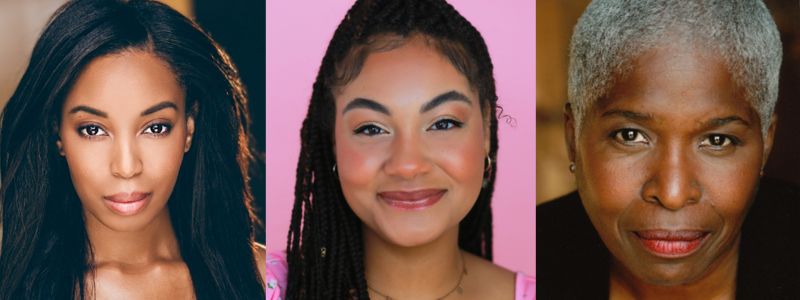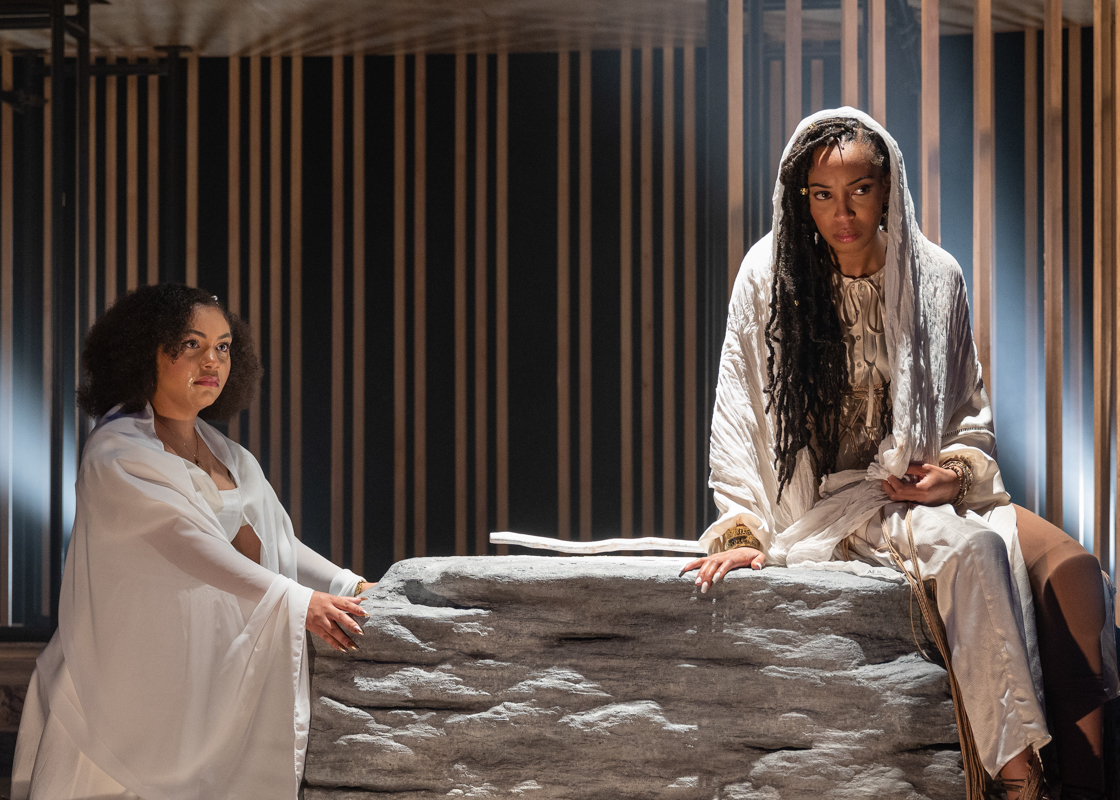In Conversation: Aeriel Williams, Ariana Burks, and Cheryl Lynn Bruce

Associate Director of Marketing Camille Oswald and Marketing Intern Eleni Lefakis met with the powerhouse trio of Aeriel Williams, Ariana Burks, and Cheryl Lynn Bruce to discuss Antigone.
Williams and Burks are reprising their roles of Antigone and Ismene after last summer’s smash hit, The Gospel at Colonus, and Cheryl Lynn Bruce joins the cast as Tiresias, the all-seeing prophet. Below, these three women discuss the play, the modern urgency of classic texts, and the ongoing pursuit of justice, revealing how Director Gabrielle Randle-Bent’s Antigone is right for right now.
What’s your background with Antigone?

Ariana: I auditioned for a production of Antigone when I was in college! I auditioned for Ismene, actually, and I didn’t get it [laughs]. Later, I played Ismene in Gospel, so that was a full-circle moment. I’m very excited because The Gospel at Colonus was about the text, but so much of it was sung. I don’t think that acting and singing are very different, but to be able to really dig into the words will be special. I’m very excited to be back. Very, very, very excited.
Aeriel: I first read it in high school, and then I covered it again at DePaul. As actor, I’m thankful to have been able to experience Antigone’s life from Oedipus Rex to The Gospel at Colonus and now Antigone.
Cheryl: I don’t think I read it in high school, actually. I read it in college in my theatre class, and I liked it right away. I really liked the character of Tiresias, too, but I never thought I’d ever get a chance to play that role, because Tiresias is described as a man, and this was back in the 70s. I’ve known the play for that long. It’s my favorite of all the plays I’ve ever read!
What were your first impressions of the language and Nicholas Rudall’s adaptation?

Aeriel: Throughout this process and this trilogy, we’ve had the opportunity to work with both Nick Rudall’s translations and the original text. There are a lot of parallels between the two, and then there are a lot of colors that I feel Nick Rudall brought out – different ways of portraying specific situations that weren’t necessarily highlighted in the original text – that helped me as a performer. There’s a monologue that I did in The Gospel at Colonus, where Antigone is begging people to listen to Oedipus’s story. The original text just said, “Hear me, this man is poor, we’re begging you for your mercy,” but Rudall’s text is specific about mothers, wives, and children. It was more like, “You, and you, and you. Mothers, I’m a child. I am your child. This is my father, we’re just like you.” It really helped me understand the severity of that situation and deliver, more so than the original text. I appreciate both, but I really do appreciate Rudall.
What does Antigone have to say about love and justice?
Cheryl: Antigone is a cautionary tale. When I was young, and first read it, I was struck by Antigone’s determination and will to honor her brother, but later, I learned that Sophocles actually wrote this play to warn people of the dangers of tyranny; what befalls a community when its tenets, rules, and agreements are flouted, are disregarded, are disobeyed. And now – after having lived through the Trump years – I understand, because I saw rules broken, traditions ignored or trampled. I saw a coarsening of discourse, a kind of vicious one-upmanship, and selfishness rewarded.

My husband, the artist Kerry James Marshall, was asked to create a monument for the National Bar Association, the organization formed in 1925 by Black lawyers after some were denied entry to the American Bar Association. He created this beautiful monument inspired by the Djembe drum, an African drum. The drum is cantilevered to represent how we seek justice but may, at times, feel that we haven’t gotten it. Justice for one person may not be justice for another, so we’re always in pursuit of it.
Ariana: I’ve been in many instances throughout my life where I was being done wrong, but was scared to say something because of the repercussions. Even though I know what’s right, and what my morals are, speaking up can be intimidating. What I love about the story of Antigone is that – without a doubt, with no hesitation – Antigone knew what was right, and she knew what she needed to do for her family, despite what was going to happen to her. That can be very hard, especially for Black women in this day and age. I’m very excited to see how we bring Antigone’s story to life and see how those ideas of love and justice are explored through a woman’s eyes.
Why is it important that we continue to revisit ancient texts?

Aeriel: Ancient texts always have a message that we need to pay attention to, specifically Antigone. The themes of Antigone appear over, and over, and over again. Love and war are still as powerful today as they were back in the ancient days. Being in a city like Chicago, and knowing the lineage of what Chicago has become – because of its legacy, and the love, and war battles that have torn families apart and brought families together here – it’s important for these stories to continue to be told. The message is clear for anybody and everyone, so I think that it’s very important that we revisit these texts, and that we revisit them with different visions, different states of mind, different people, different languages, because they still hold true. It’s that wisdom. You always want to recognize wisdom and value it. We’ve got to protect it as much as we can because it helps us move toward the future.
Cheryl: I directed Antigone at DePaul as part of an introductory course, and I remember a pupil who saw it. This young woman came up to me afterward and said, “I didn’t really want to see this play when I found out it was a Greek play, because I read a Greek play once and I didn’t like it.” And I said, “I’m glad you came. I’m glad you liked it because there are a lot of different translations, a lot of different versions of the play and, you know, some get you and some don’t.” But you can’t beat the stories. There’s a reason they’re thousands of years old and still around, because the stories examine the human predicament so beautifully and so succinctly. There are no human experiences that are not covered or examined in the Greeks. The trick is to get a translation that really speaks to you and opens up all of the ideas that are on the table, to keep the poetry and the intricacy of the story alive.
Ariana: You have to know your past to understand your present and envision the future. You have to revisit these texts to see where you’re going – to see where we’re going – and to not have history repeat itself. Texts like this show that the things that we’re facing today and the things that we struggle with now are not new to anyone.
What is it about Antigone and this process and this cast that excites you most?
Ariana: I’m excited to be with my big sis again! I love working with Aeriel, she truly inspires me as an artist and performer. I can’t wait to see what Gabby does with this production – I just know it’s just going to be so special, and so right for right now – and I’m excited to be challenged to reach new heights by the creatives and the other actors in the room.

Aeriel: I’m excited, too. Every part of this trilogy is like opening up a Pandora’s box and seeing the artists you get to work with. As you can see, Ariana and I love each other very much. When we worked together in Gospel, I was like, “Oh, this is this is going to be a problem” [laughs]. We only got to work together one time before this, and now it’s like a real big sister/little sister relationship.
I have nothing but high expectations for what’s going to come of this piece. Danielle is a monster, Julian is a monster. And what can you say about Cheryl Lynn Bruce? I mean, she’s paved the way for us to be here. This is us, walking the path that she’s dug out for us. The fact that she’s wanted to play Tiresias for so long – when I saw that casting, I knew that Gabby was coming to swing. This is the most disgusting casting, in the best way. And Timothy Edward Kane! What a way to honor this trilogy. What a way to close it out! I think it’s gonna be disgusting in a great way. In a great way.
Cheryl: I haven’t worked with most of the cast or with the director, so this is going to be an adventure! I expect to learn a great deal more about the play and, in a way, about myself, because I think that self-exploration is part of the reason I do the work that I do. This being my favorite play, I don’t have any doubt that that will happen.
We’re going to vote in a very short time after this play closes, so its emphasis on community, and obligation to oneself (and others) as a citizen, and as a moral human being, holds a different weight. As Ariana said, it’s very difficult to walk the walk. It doesn’t get easier, but that’s life. So, we keep working at it through trial and error – thousands of years of it! Lots of trial and lots of error [laughs].
Antigone is just as relevant now as it was in 441 BC. Witness Sophcles’s classic on stage from February 2 – 25, 2024. Tickets can be purchased online or by calling the Box Office at (773) 753-4472.